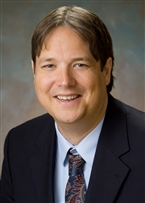Choosing the Profession
I've always loved interacting with people and being part of a performance. As an undergraduate at Dickinson College, I had a strong education in physics instruction and pedagogy. This lead to a love of teaching and hands-on-learning through experiences as a teaching assistant in various laboratory courses. At the end of my doctoral degree, I looked at my options and decided teaching fit my skill set and calling. The small size and liberal arts-based focus was the main reason I choose to teach at Mount Union.
Research
I worked with physics colleagues at Mount Union on publishing recent pedagogical advances on using computer fans to teach basic circuits. The genesis of this project came from discussions with Dr. Brandon Mitchell and myself about what would replace small-light bulbs that are used extensively to teach simple circuits. Andrea Edwards ’16 completed some of the initial work on this project as her senior culminating experience. Roy McCullough and Bill Reitz, adjuncts, contributed as well in particular helping to integrate this into our General Physics II laboratory. The first manuscript describes the conceptual viability of using computer fans to teach basic circuits. The second manuscript explores the quantitative aspects of fans in series, parallel and series resistive circuits. The third manuscript explores conceptually and quantitative the use of the fans as the resistive element in series with a capacitor in charging and discharging circuits.
Over the past decade, I applied activity-based pedagogies to develop laboratories for General Physics I and II, which has been enhanced through collaboration with colleagues. During the weekly laboratory, rather than work on one experiment in depth (as is typical of most institutions), students work on four tasks: a set of concept questions and three different experiments. This allows for a larger number of experiments to be covered and for students to appreciate how the principles of physics emerge in different situations. Most experiments are outcome driven, but some are conceptual, or inquiry-based. Post-lab, students complete a short writing assignment for each task. Students answer specific questions related to their experience and put their understanding of the concepts, experiments, and results into their own words. At the end of each course, we use nationally normed concept tests to demonstrate the success of our students’ learning.
A Passion for Teaching
Watching students grow from an intelligent, non-studying, student into a successful scholar. Our interactions outside of the formal classroom cements a relationship that can last for years after they graduate.
Professionally, I am a teacher before all other titles. I engage students in active learning techniques whenever possible, from a hands-on lab experiment to a conceptual discussion with peer interaction and discussion. Lectures are a necessary evil as a quick exposure to content, but it rarely leads to an understanding of knowledge. Experience is necessary to develop the conceptual and mathematical constructs used in physics, which is deeply tied to the ability to problem solve and physically experience the theory in a laboratory setting. Project development is also important, regardless of topic, as it shows the application of the physics and ability of the students. This is not to say I am a perfect teacher; I always have room for improvement and the students always force me to rethink and reevaluate methodology to optimize their learning. I have attended meetings of the American Association of Physics Teachers (AAPT) and other organizations, which have been great opportunities to interact with college and high-school physics teachers. I am honored to be named the University of Mount Union, “Great Teacher” for 2013, which was chosen by the graduating class of 2013.
Why Mount Union?
The liberal arts are quite important as they demonstrate the importance of being a well-rounded individual and that your degree or career are not the only things that define you. Mount Union does an excellent job of focusing on the breadth and depth of students' education. The Physics majors and minors that graduate from Mount Union have gone on to be quite successful, and I am quite proud of their myriad of accomplishments.
Unique Program
- Faculty Award for Distinguished Service – University of Mount Union, May 2021 2013
- Great Teacher Award – University of Mount Union
- Award for Scholarly and Leadership Development of fraternal and sorority life students, National Order of Mega, Pi Omicron Chapter UMU, January 2013 & 2014
- 2012 Excellence in Education Award - Ohio Magazine
